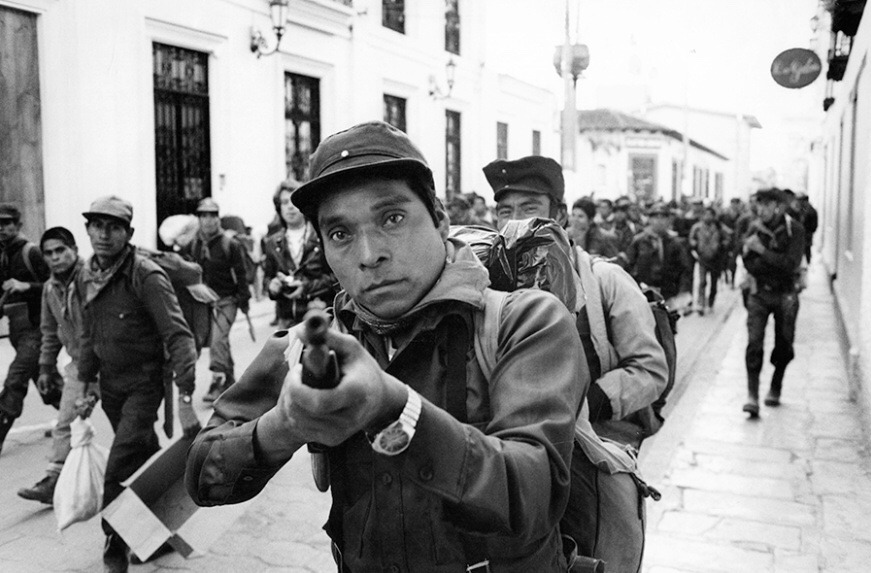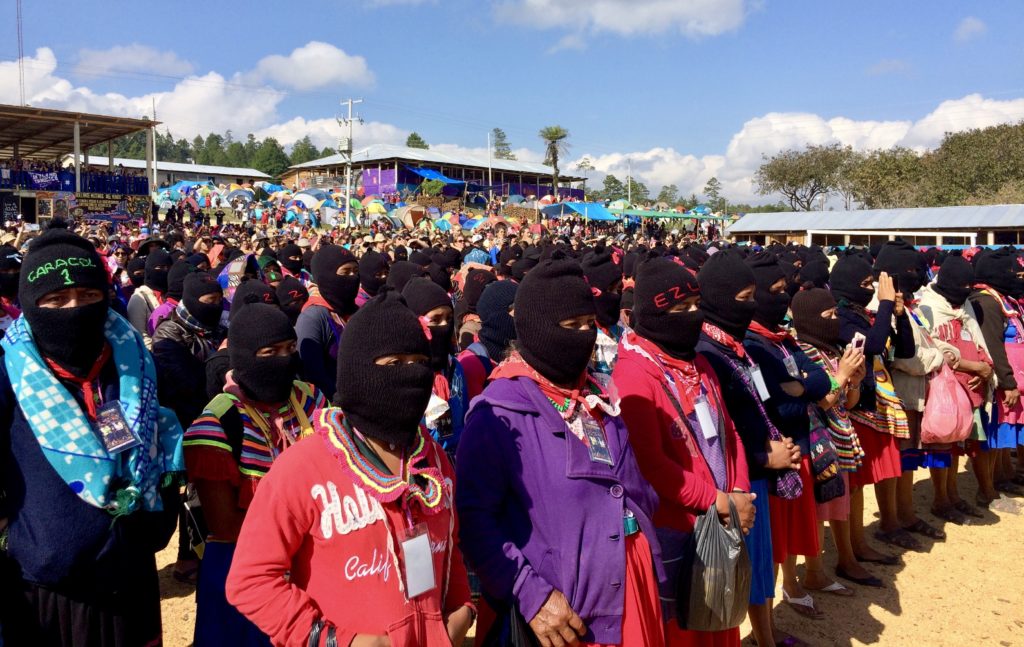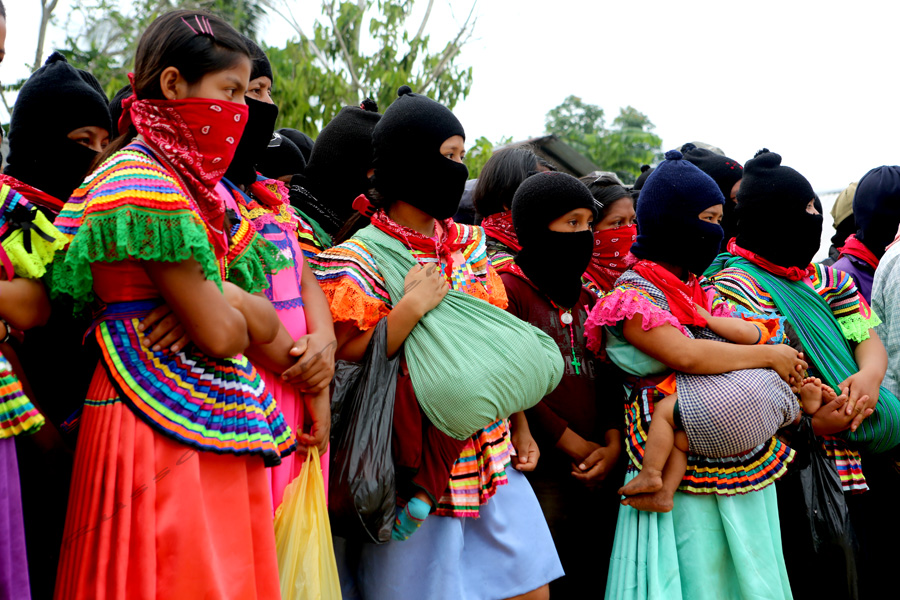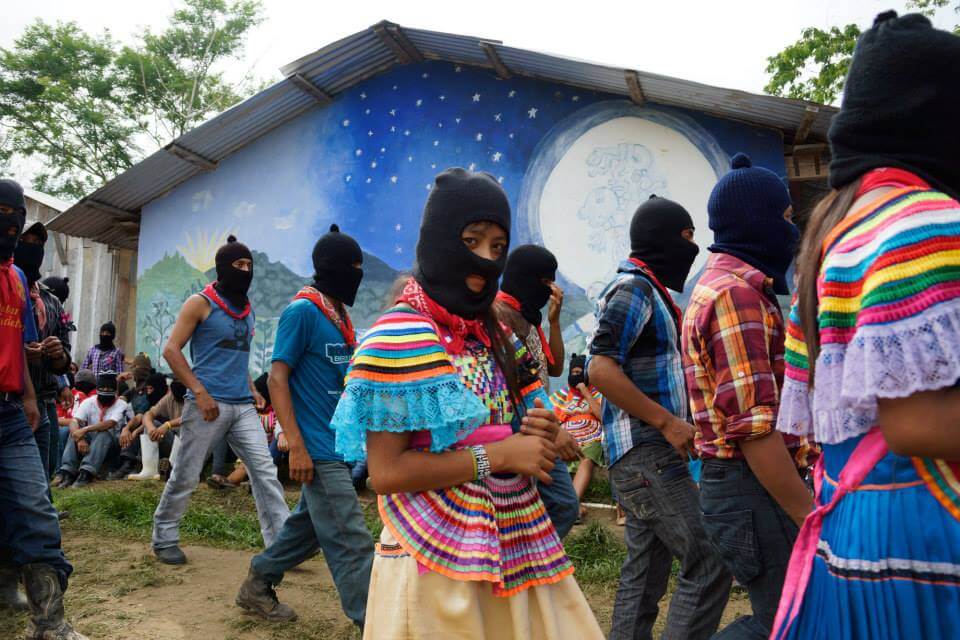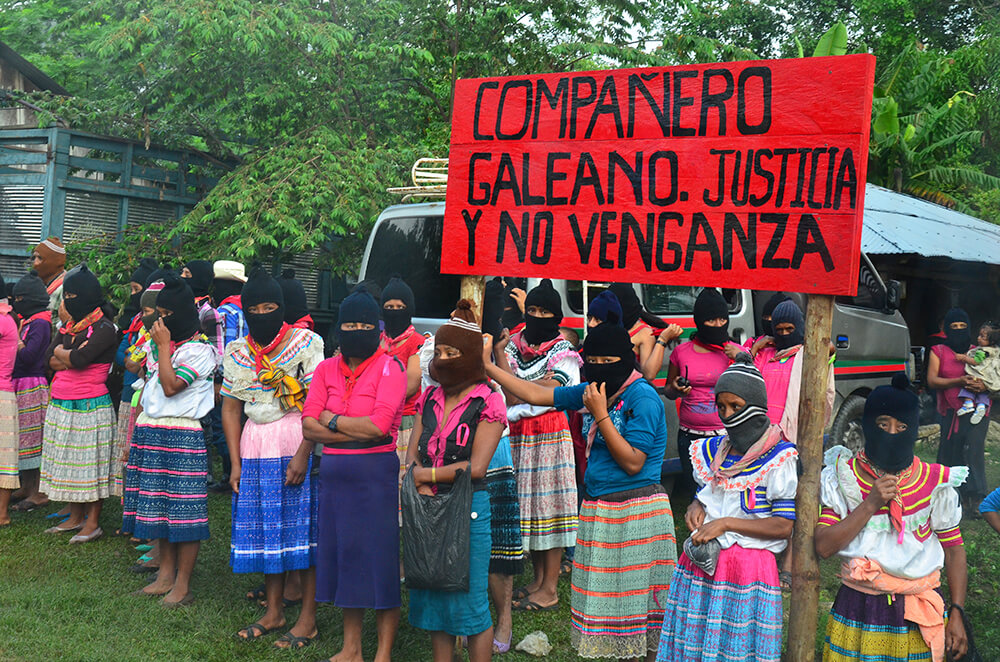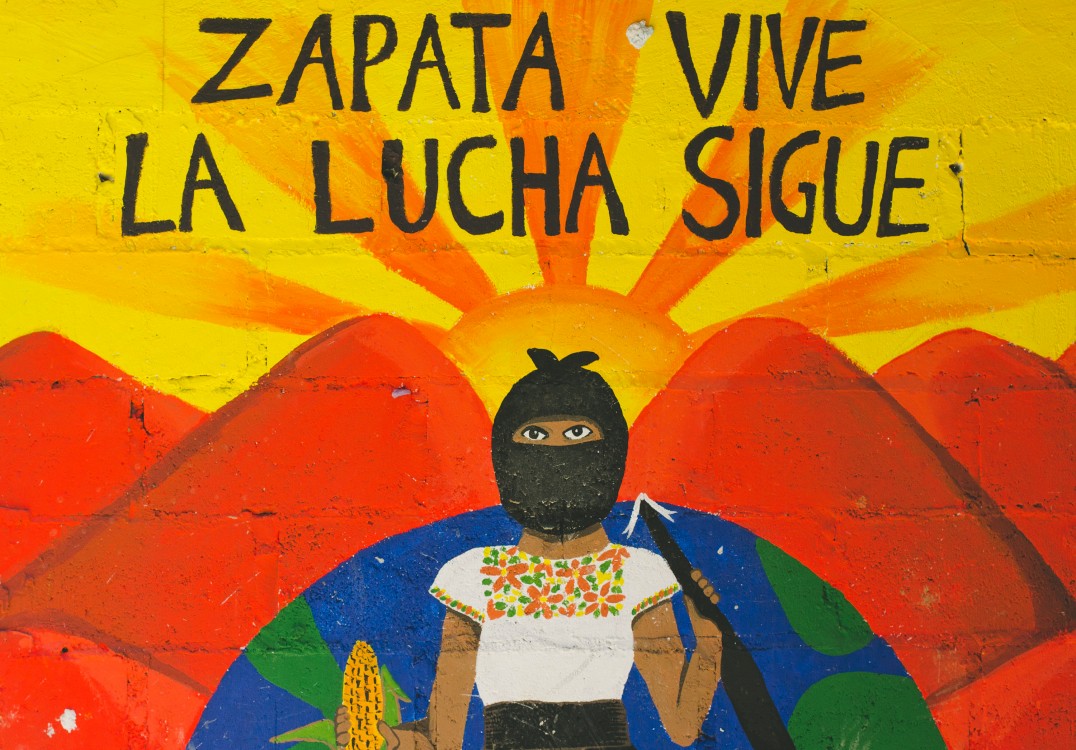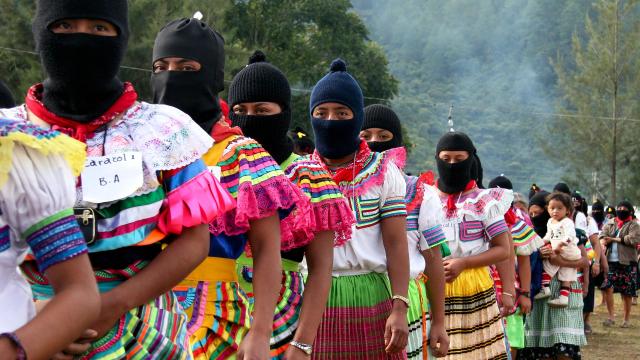
This is Part 3 in a series about Radical Municipalism, looking at ways people worldwide are organizing in their cities to build power from the bottom up. Read Part 1 (Brazil) Part 2 (Rojava), Part 3 (Chiapas), Part 4 (Warsaw), Part 5 (Bologna), Part 6 (Jackson), Part 7 (Athens) and Part 8 (Warsaw & New York), Part 9 (Reykjavík), and Part 10 (Argentina).
Everything changed New Year's Day 1994, when Zapatistas took autonomous control of their land in Chiapas, southern Mexico. This coincided with implementation of NAFTA, one footnote in a long history of colonialism, exploitation and injustice against the people of the Western Hemisphere. The Zapatistas are part of a rich vein of resistance, and one of the most important in recent times, reaching far beyond Mexico.
Ya Basta! (Enough Already)
On January 1, 1994, Subcomandante Ana Maria led the Zapatistas – indigenous people, one-third of them women, wearing ski masks and carrying mostly wooden replica guns – to capture the town of San Cristobal. In doing so, the group reclaimed land across Chiapas. Twelve days of fighting and 100 deaths later, the Mexican state agreed to a ceasefire.
Peace talks followed, and both sides signed the San Andres Accords, in 1996, although the Mexican government never fulfilled its commitments. Skirmishes continue until today, but the indigenous people maintain their autonomy. It is not only a story of armed rebellion. Zapatismo power is more about words than guns.
Globally, neoliberalism peaked in arrogance in the mid-1990s. The Zapatistas dispelled any argument that "there is no alternative". They showed the world a third way: co-creating power from the bottom up. Their path diverged from the centralization of power inherent in state-oriented capitalist and communist systems. The journey continues.
Building Autonomy
Within Zapatismo, creating autonomy means every "world" has its place, respecting indigenous customs and knowledge. The Women’s Revolutionary Law was passed two years before the Zapatistas reclaimed their land, and the 10-point charter made women's liberation central to the new order.
They rejected "bad government" – meaning Mexican state handouts, programs, services and interference. Instead, the land was divided into five autonomous areas, known as "caracoles", or snails, under the mantra: “We go slowly, as we go far”.
These self-governing units provide schools, teaching in both indigenous and Spanish languages; and they provide healthcare based in both indigenous and Western knowledge. Economically, cooperatives form a strong part of the economy – not least producing coffee. Community banking is created through credit unions. The whole Zapatista region has around 250,000 inhabitants, covering roughly a third of Chiapas. Neighbouring peoples can also access services.
The rebel zone divides into 27 Rebel Zapatistas Autonomous Municipalities. These run on world-leading participatory democratic ideals, namely “mandar obedeciendo” (to lead by obeying). Local representatives rotate regularly, and they aim at gender parity. Being a representative is an unpaid honor, but one is fed by the community.
Forerunners in the Municipal Fight Against Neoliberalism
The Zapatistas said NAFTA would be the “death certificate” for rural Mexicans. In most respects they were right, as cheap U.S. exports decimated farmers' livelihoods, creating much of the exodus that stoked the current U.S. immigration debate.
Media savvy, and fighting neoliberalism with an alternative system of their own, the Zapatistas have been called the "first postmodern revolution". They rose up during a worldwide anti-globalization movement resisting organisations like the International Monetary Fund and World Trade Organization. This neoliberal architecture pushed what has become austerity and other free trade agreements such as the Trans-Pacific Partnership (TPP) and its European counterpart, TTIP.
Amid the anti-globalization rage and resistance, the Zapatistas showed an example of how to create counter-power. They showed participative democracy in action as their political philosophy asserted women's liberation and worked through consensus. Fast-forward to the 2011 Squares movements that emerged around the Global North after the 2008 crisis – from Spain's 15M to Occupy to Germany's Blockupy – and Zapatismo were influential in re-imagining politics in the Global North.
"As soon as I arrived I saw that many of the principles, language, themes and ways of organizing Occupy Wall Street had been taken straight from Zapatista philosophy," Rebecca Manski, an Occupy Wall Street supporter, told Al Jazeera in 2014 after visiting a Zapatista summer school.
In the European context, the post-15M movement has gone furthest toward creating a radical municipal future. Spain's popular councils are women-led and an example of participative local democracy, where people literally "lead by obeying". Some of the Spanish rebel cities' first measures after 2011 were to level local governments – cutting representatives' salaries, for instance, and moving toward the Chiapas model.
Grounding the struggle locally and simultaneously reaching out for solidarity elsewhere explains Zapatista resilience, and is a thread in emerging radical municipalism. It engages international solidarity while building local counter-power. This diverges from classic leftist class struggle, which is more exclusive, often focusing on working class men and leaving aside other oppressed communities, thereby gaining less support.
The overarching approach of the Zapatistas is the call for intersectional solidarity. One example is when Zapatistas spokesperson Subcomandante Marcos was called gay in the mid-1990s, a supposed attack by pro-Mexican detractors. He responded: "Yes, Marcos is gay. Marcos is gay in San Francisco, Black in South Africa, Asian in Europe, a Chicano in San Ysidro, an anarchist in Spain, a Palestinian in Israel, a Mayan Indian in the streets of San Cristobal, a Jew in Germany, a Gypsy in Poland, a Mohawk in Quebec, a pacifist in Bosnia, a single woman on the Metro at 10pm, a peasant without land, a gang member in the slums, an unemployed worker, an unhappy student and, of course, a Zapatista in the mountains."
Preguntando Caminamos (Asking While We Walk)
The Zapatistas evolution shows how their democracy is all about the journey, not the destination. From the outset, the Zapatistas were clear they only resorted to violence to protect their lives. After the peace accords failed, they opted to unilaterally push for autonomy, using self-defence against the Mexican state while implementing the caracoles. Snails are a slow moving symbol. They detached the armed community from democratic structures.
More recently, the Zapatistas have renounced all violence, as Mexico has been ravaged by the continent-wide so-called "War on Drugs". Another success of Zapatismo is keeping the drugs and state incursions out of their parts of Chiapas.
With this shift, the Zapatistas changed tact on political engagement. They supported the campaign for María de Jesús Patricio Martínez, an indigenous healer from X nation to run in the parliamentary race, known as Marichuy.
Marichuy, a representative of the Mexican government's Indigenous Council election platform, wasn't aiming to win. It wanted primarily to build solidarity against violence to women and the threat extractive industries post to indigenous communities.
On an election tour for Marichuy, only women spoke, including indigenous women from across Mexico and a subcomandante from the Zapatistas. The campaign message, which offered solidarity across Mexican society to everyone facing the destruction and destitution levelled by the capitalist system, remained grounded in the indigenous fight.
Marichuy asserted: “We need to amplify and strengthen the organizational structure of our rage and pain, so that throughout the country, we make the earth tremble at its center and allow the survival of the native peoples and the reconstruction of a Mexico that has been intentionally torn apart by those who have the power."
Read Part 1 (Brazil) Part 2 (Rojava), Part 3 (Chiapas), Part 4 (Warsaw), Part 5 (Bologna), Part 6 (Jackson), Part 7 (Athens) and Part 8 (Warsaw & New York), Part 9 (Reykjavík), and Part 10 (Argentina).

